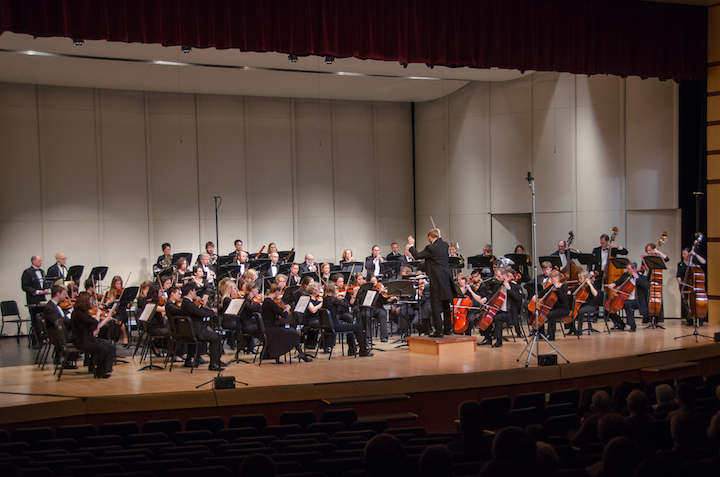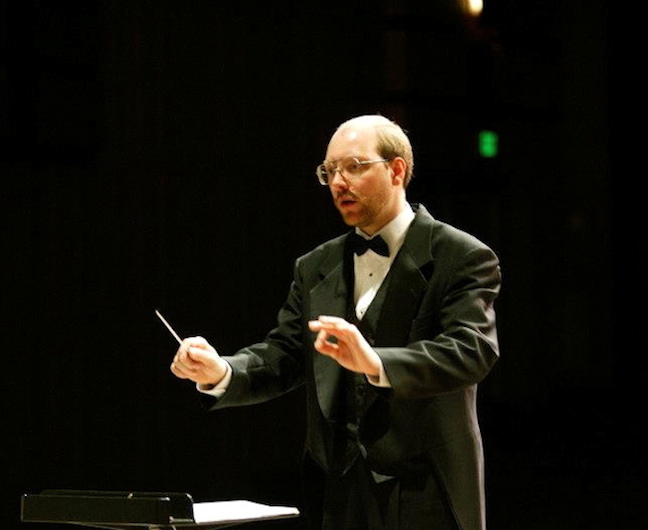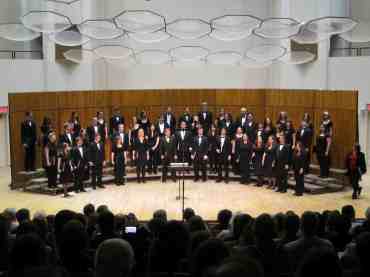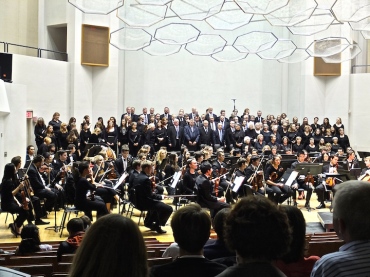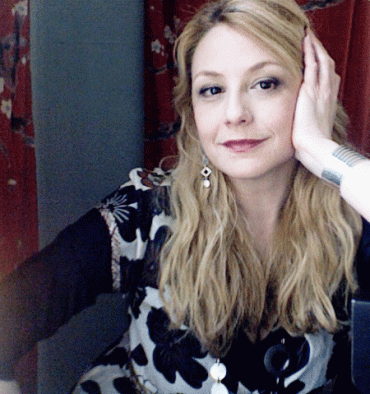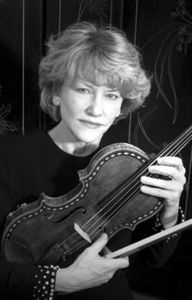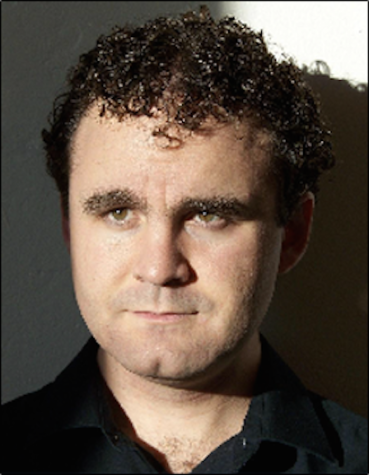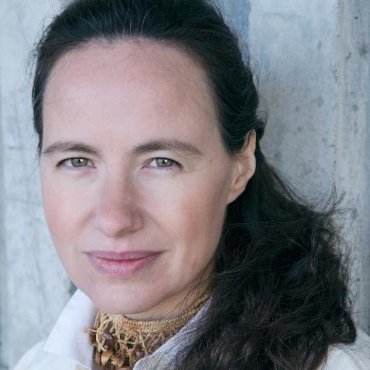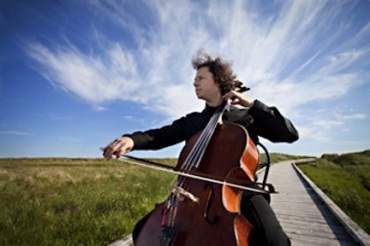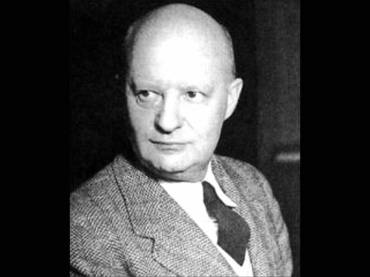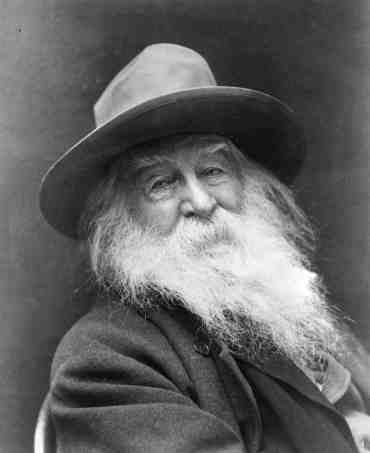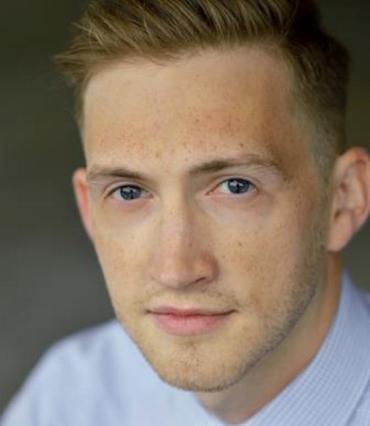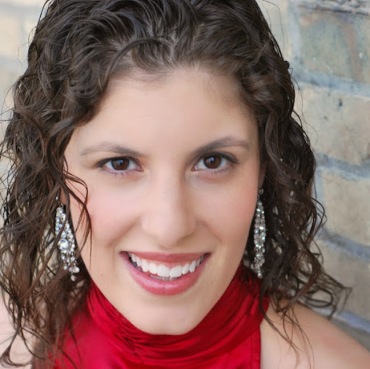The Well-Tempered Ear
This Saturday night the Wisconsin Chamber Choir and Grammy winner Sarah Brailey perform a free live-streamed concert of music by women
Leave a Comment
PLEASE HELP THE EAR. IF YOU LIKE A CERTAIN BLOG POST, SPREAD THE WORD. FORWARD A LINK TO IT OR, SHARE IT or TAG IT (not just “Like” it) ON FACEBOOK. Performers can use the extra exposure to draw potential audience members to an event. And you might even attract new readers and subscribers to the blog.
By Jacob Stockinger
The Ear has received the following announcement to post:
The Wisconsin Chamber Choir (WCC, below) with a special guest — Grammy Award-winning soprano and UW-Madison graduate Sarah Brailey – will perform this Saturday, May 15, at 7 p.m.
“Music She Wrote” is a celebration of music composed by a highly diverse group of women from many ages.
Choir members will sing from their individual cars using wireless microphones, listening to the sound of the whole choir via their car radios.
The audience is invited to listen in live on YouTube and to let us know they are interested by sending an RSVP to our Facebook event.
There is no charge to view the livestream, but donations will be welcome.
Here are the links to hear the performance LIVE on YouTube or Facebook:
https://youtu.be/Iaz0wZhuG18 or:
https://www.facebook.com/events/1561155960751974/
The WCC had scheduled a regular concert with an all-female cast of composers for May 2020, which fell victim to Covid-19. As it became obvious that the pandemic would last longer, the WCC started exploring new ways of making and disseminating music.
From September 2020, we resumed activity in the shape of the Parking Lot Choir, generating local media coverage from WKOW-TV and Madison Magazine, whose story was headlined “Forget tailgates, parking lots are for choir practice.”
The result of this first rehearsal run was the widely acclaimed “Car Carols” concert in December 2020, whose format is the model for “Music She Wrote.”
In addition to the Parking Lot Choir, three smaller groups from the WCC assembled at the Edgewood College Amphitheater on Saturday mornings to rehearse (below) in widely spaced formations, wearing specially designed singer masks.
Another such group, made up of our members from southeastern Wisconsin, met in Whitewater on Sunday afternoons. Recordings by those four small groups will be aired during the May 15 broadcast in addition to live singing by the Parking Lot choristers.
The program includes: the Garden Songs by Fanny Hensel, née Mendelssohn (Felix’s sister, below), which were intended for outdoor performance; and Ethel Smyth’s March of the Women, the anthem of the women’s suffrage movement in the English-speaking world.
In addition to works by African American composers Ysaÿe M. Barnwell (below top) and Rosephanye Powell and by Cuban composer Beatriz Corona (below second), the program includes samples from outside the Western tradition — Lamma Badaa Yatathannaa, sung in Arabic, by Shireen Abu-Shader (below third), who hails from Jordan but received her academic education in the U.S. and Canada; and two pieces by Japanese composer Makiko Kinoshita (below bottom).
Western early music is represented by Italian composers Raffaella Aleotti (below top) and Chiara Cozzolani (below bottom), who lived in the 16th and 17th centuries.
Finally, there is singer-songwriter Judy Collins with her Song for Sarajevo, composed for the children of the war in Bosnia in 1994 and arranged by her longtime collaborator, Russell Walden. (You can hear it in the YouTube video at the bottom.)
For more details, visit: https://www.wisconsinchamberchoir.org/music-she-wrote.
Sarah Brailey (below, in a photo by Miranda Loud), a native of Wisconsin, studied at the Eastman School of Music and the University of Wisconsin–Madison, where she has just completed her doctorate. A consummate musician and internationally acclaimed soloist, she recently won a Grammy Award in the Best Classical Vocal Solo Album category for her role as The Soul in the world premiere recording of Ethel Smyth’s The Prison.
She is familiar to Madison audiences not only as a performer and co-founder of Just Bach but also as the co-host of WORT’s Musica Antiqua show on FM 89.9 and the director of Grace Presents.
As a graduate student, she joined the WCC for two seasons from 2004 to 2006. We are thrilled to welcome her back! For more information on Sarah, see her website at https://sarahbrailey.com
Tags: #All-Female, #All-FemaleConcert, #ArabicComposer, #BaroqueMusic, #BeatrizCorona, #BlackComposer, #BlogPost, #BlogPosting, #BosnianWar, #CarCarols, #CarRadio, #ChoralMusic, #ChristianChurch, #CityofMadison, #CoronavirusPandemic, #COVID-19, #Cubancomposer, #EastmanSchoolofMusic, #EdgewoodCollege, #EthelSmyth, #FacebookPost, #FacebookPosting, #FannyMendelssohn-Hensel, #FelixMendelssohn, #GraceEpiscopalChurch, #GracePresents, #Grammy-winning, #GrammyAward, #GuestArtist, #italianComposer, #JacobStockinger, #JapaneseComposer, #JudyCollins, #JustBach, #LiveStreaming, #MadisonMagazine, #MadisonWisconsin, #MakikoKinoshita, #MeadWitterSchoolofMusic, #MusicaAntiqua, #MusicEducation, #MusicSheWrote, #NewMusic, #NoCharge, #OnlineConcert, #ParkingLotChoir, #PopMusic, #RadioHost, #RaffaellaAleotti, #RomeItaly, #RosephanyePowell, #SarahBrailey, #ShireenAbu-Shader, #SocialDistance, #SongforSarajevo, #SongWriter, #SopranoSinger, #TheEar, #TheInternet, #ThePrison, #TheU.S., #TheUW, #UnitedStates, #UniversityofWisconsin-Madison, #UniversityOpera, #VirtualConcert, #VocalMusic, #WarnerPark, #Whitewater, #WhitewaterWisconsin, #WisconsinChamberChoir, #WKOWTV, #Women'sSuffrage, #WomenComposers, #WORT-FM89.9, #YouTubevideo, #YsayeBarnwell, activity, African American, ages, anthem, Arab, Arabic, Arabic composer, arrangement, Arts, audience, auto, Baroque, Beatriz Corona, black composer, blog, Bosnia, Brailey, Broadcast, Canada, car, Car Carols, car radio, category, celebration, Chiara Cozzolani, children, Choir, choral music, chorus, Christian, church, Classical music, collaborator, Collins, compose, composer, Concert, Corona, coronavirus, Cuban, Cubas, design, director, disseminate, diverse, doctorate, donation, Early music, Eastman School of Music, Edgewood College, Education, English, Ethel Smyth, European, event, explore, Facebook, Facebook post, Facebook posting, familiar, Fanny Mendelssohn Hensel, farden, Felix Mendelssohn, formation, forward, free, Grace Episcopal Church, Grace Presents, graduate, Grammy, group, guest artist, headline, hear, information, interest, Internet, Italian, Jacob Stockinger, Japan, Japanese composer, Jordan, Judy Collins, Just Bach, Kinoshita, know, like, link, listen, live, livestream, local, longtime, Madison, Madison Magazine, make, Makiko Kinoshita, march, masks, Mead Witter School of Music, media, microphones, model, morning, Music, Music education, Music She Wrote, Musica Antiqua, native, New Music, no charge, online, outdoor, pandemic, Parking Lot Choir, performance, performer, pieces, pop, pop music, popular, post, posting, Powell, prison, Radio, radio host, Raffaella Aleotti, register, rehearsal, resume, role, Rosephanye Powell, RSVP, Sarah Brailey, Saturday, schedule, send, shape, share, Shireen Abu-Khader, singer, Singing, Smyth, social distance, solo, song, Song for Sarajevo, soprano, soul, Sound, speak, special, story, suffrage, sung, tag, tailgate, Television, The Ear, tradition, TV, U.S., United States, University of Wisconsin-Madison School of Music, University of Wisconsin–Madison, University Opera, UW, UW-Madison, victim, view, virtual, vocal music, war, Warner Park, WCC, wear, Website, welcome, Western, wireless, Wisconsin, Wisconsin Chamber Choir, WKOW TV, women, women composers, women's suffrage, world, WORT FM 88.9, YouTube, Ysaye Barnwell
This Saturday afternoon, the Wisconsin Chamber Choir presents a free online parking lot concert of “Car Carols” with an emphasis on African-American composers
Leave a Comment
PLEASE HELP THE EAR. IF YOU LIKE A CERTAIN BLOG POST, SPREAD THE WORD. FORWARD A LINK TO IT OR, SHARE IT or TAG IT (not just “Like” it) ON FACEBOOK. Performers can use the extra exposure to draw potential audience members to an event. And you might even attract new readers and subscribers to the blog.
By Jacob Stockinger
The Ear has received the following announcement to post:
Join the Wisconsin Chamber Choir (below) this Saturday afternoon, Dec. 12, at 2 p.m. for Car Carols, a unique holiday concert featuring live, socially-distanced performances of music by African-American composers and seasonal favorites.
Choir members will sing from their individual cars using wireless microphones (below), listening to the sound of the whole choir via their car radios. The audience is invited to join our Facebook event or listen in live on YouTube.
There is no charge to view the live-stream, but donations would be welcome.
You can find the concert on this Saturday, Dec. 12, a 2 p.m. via the following links: live on YouTube at https://youtu.be/ZonVn1cvgb8, or on Facebook at: https://www.facebook.com/events/1561155960751974/
This unusual concert format was necessitated by the Covid-19 pandemic, but the WCC is grateful for the opportunity to continue singing together in safe ways.
Since September, the choir has been rehearsing as a Parking Lot Choir, generating local media coverage from WKOW-TV at https://wkow.com/2020/10/13/wisconsin-chamber-choir-making-adjustments-to-prepare-for-performance/ and Madison Magazine, whose story was headlined “Forget tailgates, parking lots are for choir practice: https://www.channel3000.com/forget-tailgates-parking-lots-are-for-choir-practice/
This past September and October, smaller groups from the WCC assembled on Saturday mornings at the Warner Park Pavilion to rehearse in widely spaced formations.
They wore specially designed singers masks, and occasionally harmonized with nearby sandhill cranes that seemed unsure what to make of the a cappella music floating through their habitat.
Recordings by five distinct small ensembles — minus the cranes — will be aired during the Dec. 12 Car Carols broadcast, in addition to live singing by the Parking Lot choristers.
The Car Carols repertoire highlights music by African-American composers spanning nearly a century. Idiomatic pieces in the style of spirituals and contemporary gospel alternate with “non-idiomatic” motets and anthems by Nathaniel Dett (below top), William Dawson, Undine Smith Moore (below middle) and Carlos Simon (below bottom, with an oral self-portrait in the YouTube video at the bottom).
The remainder of the Parking Lot Choir selections consists of carol arrangements by WCC favorites — the late Stephen Paulus (below) and Peter Blotch — and feature virtual harp and violin accompaniment.
Live and virtual performers will also unite to sing Craig Hella Johnson’s moving arrangement of the songs I Love You and What a Wonderful World.
Interspersed between the live Car Carols will be a wide variety of pre-recorded selections, including the world premiere of WCC member Linda Palmer’s arrangement of Sussex Carol, plus music by Johannes Brahms, John Rutter, 17th-century female composer Chiara Cozzolani (below), and Tleycantimo choquilia, a carol from colonial-era Mexico, sung in Spanish and Nahuatl.
Founded in 1998, the Wisconsin Chamber Choir has established a reputation for excellence in the performance of oratorios by Bach, Handel, Mozart and Brahms; a cappella works from various centuries; and world-premieres.
Artistic director Robert Gehrenbeck (below), who heads the choral program at the University of Wisconsin-Whitewater, has been hailed by critics for his vibrant and emotionally compelling interpretations of a wide variety of choral masterworks. WCC members have acknowledged Gehrenbeck for his intrepid conducting in freezing temperatures during Parking Lot Choir rehearsals.
Tags: #ACappella, #African-AmericanComposer, #AltoSinger, #ArtisticDirector, #BaroqueOratorio, #BassSinger, #BlackComposer, #Blackcomposers, #BlogPost, #BlogPosting, #CarCarols, #CarlosSimon, #ChamberChoir, #ChiaraCozzolani, #ChoralMusic, #ChristianReligion, #ChristmasCarol, #ContemporaryComposer, #COVID-19, #CraigHellaJohnson, #FacebookPost, #FacebookPosting, #FemaleComposer, #GeorgeFridericHandel, #GospelMusic, #HolidayConcert, #HolidayMusic, #ILoveYou, #JacobStockinger, #JohannesBrahms, #JohannSebastianBach, #JohnRutter, #LindaPalmer, #LiveStreaming, #MadisonMagazine, #MexicanComposer, #MusicalInterpretation, #MusicalStyle, #MusicCritic, #NahuatlLanguage, #NathanielDett, #NegroSpiritual, #NewMusic, #OnlineConcert, #ParkingLot, #PeterBloesch, #RecordedMusic, #RobertGehrenbeck, #SandhillCranes, #SaturdayAfternoon, #SaturdayMorning, #SeasonalMusic, #SingAlong, #SocialDistance, #SociallyDistanced, #SopranoSinger, #StephenPaulus, #SussexCarol, #TenorSinger, #TheEar, #UndineSmithMoore, #UniversityofWisconsin, #VirtualConcert, #WarnerPark, #WhataWonderfulWorld, #WilliamDawson, #WisconsinChamberChoir, #WolfgangAmadeusMozart, #WorldPremiere, #YouTubevideo, 17th century, a cappella, accompaniment, African American, African-American music, afternoon, air, aired, alternate, alto, announcement, anthem, arrangement, Artistic director, Arts, assemble, audience, auto, automobile, Bach, baritone, Baroque, bass singer, black, blog, Blog post, blog posting, Brahms, Broadcast, car, Car Carols, Carlos Simon, Carol, century, Chamber choir, Chiara Cozzolani, Choir, choral, choral music, choristers, Christian, Christmas, Classical music, colonial, compelling, composer, Concert, Conducting, conductor, contemporary, continue, coverage', Craig Hella Johnson, critic, Dawson, design, Dett, director, distinct, donation, Early music, earlymusic, emotional, enemble, Facebook, Facebook post, Facebook posting, favorites, female, female composer, floating, formation, forward, freezing, George Frideric Handel, gospel, habitat, hail, Handel, harmonize, harp, highlight, holiday concert, holiday music, I Love You, idiomatic, individual, interpretation, intrepid, ivited, Jacob Stockinger, Johann Sebastian Bach, Johannes Brahms, John Rutter, join, like, Linda Palmer, link, listen, live, live-stream, livestream, local, Love, Madison, Madison Magazine, masks, Masterworks, media, members, Mexican, Mexico, microphone, mixed, Moore, morning, motet, moving, Mozart, Music, music critic, musical style, Nahuatl, Nathaniel Dett, Negro spiritual, New Music, non-idiomatic, October, online, oral, oratorio, parking lot, Paulus, pavilion, Peter Bloesch, portrait, post, practice, pre-recorded, premiere, program, recorded music, recording, rehearsal, rehearse, reminder, repertoire, repertory, reputation, Robert Gehrenbeck, rsdio, Rutter, sage, sandhill cranes, Saturday, seasonal, seasonal music, selections, self-portrait, September, share, Simon, sing, sing-along, singers, Singing, small, social distance, socially distanced, soprano, space, spaced, span, Spanish, spceially, spiritual, spirituals, Stephen Paulus, style, sung, Sussex Carol, tag, televison, temperature, tenor, The Ear, TV, unique, unite, United States, University of Wisconsin, unsure, Uridine Smith Moore, UW-Whitewater, variety, vibrant, Violin, violinist, virtual, vocal music, Warner Park, welcome, What a Wonderful World, wide, William Dawson, wireless, Wisconsin, Wisconsin Chamber Choir, WKOW TV, Wolfgang Amadeus Mozart, wonderful, work, world, world premiere, YouTube
Classical music: COVID-19 pandemic forces more major changes for Concerts on the Square and a cancellation by the Mosaic Chamber Players
Leave a Comment
PLEASE HELP THE EAR. IF YOU LIKE A CERTAIN BLOG POST, SPREAD THE WORD. FORWARD A LINK TO IT OR, SHARE IT or TAG IT (not just “Like” it) ON FACEBOOK. Performers can use the extra exposure to draw potential audience members to an event. And you might even attract new readers and subscribers to the blog.
ALERT: The Ear has received the following note from Jess Salek — the founder, director and pianist of the Mosaic Chamber Players: “Just a note to mention that the concert scheduled for this Saturday, June 13, is cancelled due to COVID-19. We are doing our best to stay positive during this difficult time for local arts groups, and we will resume our music-making as soon as is safe. Please be well!”
By Jacob Stockinger
Major changes are in store for the annual Concerts on the Square, which were already postponed with a change of dates, day and time, according to television WKOW-TV Channel 27 (you can hear the TV news report in the YouTube video at the bottom):
Here are details:
MADISON (WKOW) – The Wisconsin Chamber Orchestra (WCO) has unveiled a new plan for its 2020 Concerts on the Square series (below), which involves replacing the four postponed concerts with two drive-in performances.
Additionally, they’re planning for two live concerts at Breese Stevens Field if playing outdoors is deemed safe in late summer.
The revised approach was necessary to keep attendees safe, while adhering to state and county requirements that don’t allow for large gatherings, according to a WCO news release.
The WCO will follow Forward Dane Health Guidelines to determine if the live concerts can occur. A decision will be made in late July.
“We were optimistic in April that if we only delayed the start of Concerts on the Square to late July that we could still hold live performances downtown,” said Joe Loehnis (below), the WCO’s CEO. “But as the pandemic continues to affect us all in ways we never could have foreseen, we’ve decided to take creative steps now that will allow us to still share music with our community.”
The new plan for Concerts on the Square looks like this:
- The first four shows (July 28 – Aug 18) have been postponed until the summer of 2021.
- The WCO, in partnership with the Madison Mallards, will host two “drive-in” concerts on June 24 and July 22 (more information below). Each concert also will be live-streamed on https://wcoconcerts.org and https://pbswisconsin.org for free.
- The final two Concerts on the Square will be live concerts at Breese Stevens Field on Aug. 25 and Sept. 1.
- The WCO’s annual “runout” concert to Portage this summer has been canceled.
Drive-in Concerts on the Square
The two drive-in concerts will feature rebroadcasts of the most popular Concerts on the Square performances, thanks to a partnership with PBS Wisconsin.
The WCO expects to be able to have 115 vehicles at each concert. The goal is to make it accessible to as many people as possible without risking health and safety.
The basics for each program are:
Location: Warner Park, 2930 N. Sherman Ave., Madison
Cost: $25 per car
Time: 7-8 p.m.; 8:45-9:45 p.m. (two showings each night to allow more people to attend)
Additional information: To purchase tickets, visit:
- 8:45 p.m. concert: https://madison-mallards.nwltickets.com/Tickets/SelectPromoSeats?UserPromoCode=wco8
June 24 – “S Wonderful” with Amanda Huddleston, soprano, and Andrew Clark, tenor. Songs include: “The Sound of Music” Medley, “Smoke Gets in Your Eyes,” “Armed Forces Salute” and “1812 Overture.” (2015 Performance)
July 22 – “Film Night,” featuring concertmaster Suzanne Beia. Songs include: “The Magnificent Seven,” “The Pink Panther,” “Raiders of the Lost Ark,” “Schindler’s List” and “E.T.” (2019 Performance)
“With two showings each night, we’re trying to make the concerts as accessible as possible,” Loehnis said. “Community partnerships are so important right now, and because of PBS Wisconsin and the Mallards, we’re able to bring this idea to life. We are grateful for these partnerships.”
Breese Stevens concerts are planned for late summer. If Dane County has entered Phase III of its Forward Dane plan by late August, 250 people will be allowed to gather for outdoor events.
For that reason, the WCO is planning to host two live Concerts on the Square at Breese Stevens.
The WCO will provide an update later in July on progress for this opportunity. Those shows currently are scheduled for Aug. 25 and Sept. 1.
The WCO also is considering how it could broadcast the live performances to other venues such as the Alliant Energy Center, Warner Park or Madison parks, where others could view the concerts safely.
“We’re still working through the logistics, and we’re realists – understanding that the situation changes almost daily,” Loehnis said. “But we also want to be forward-thinking and we’re going to keep pushing ahead unless we don’t believe a live show can be held safely.”
To keep up-to-date with performance schedules, community members can sign up for email updates on the WCO website or follow the orchestra on Facebook (https://www.facebook.com/search/top/?q=wisconsin%20chamber%20orchestra&epa=SEARCH_BOX) and Instagram.
Tags: #AlliantEnergyCenter, #AmandaHuddleston, #AndrewClark, #ArmedForces, #ArmedForcesSalute, #BlogPost, #BlogPosting, #BreeseStevensField, #ChamberMusic, #Channel27, #CityofMadison, #CollaborativePianist, #ConcertsontheSquare, #COVID-19, #DaneCounty, #E.T., #FacebookPost, #FacebookPosting, #FilmMusic, #ForwardDane, #HomeWebsite, #InstagramPost, #JacobStockinger, #JessSalek, #JoeLoehnis, #JohnWilliams, #LiveConcert, #MadisonMallards, #MagnificentSeven, #MosaicChamberPlayers, #MovieMusic, #MovieScore, #Music-Making, #NewRelease, #OnlineConcert, #PBSWisconsin, #PeterIlyichTchaikovsky, #PinkPanther, #PortageWisconsin, #PublicHealth, #RaidersoftheLostArk, #Schindler'sList, #September11, #SmokeGetsinYourEyes, #SopranoSinger, #SoundofMusic, #StevenSpielberg, #SuzanneBeia, #TenorSinger, #TheEar, #VirtualConcert, #VocalMusic, #WarnerPark, #WisconsinChamberOrchestra, #WisconsinPublicTelevision, #YouTubevideo, 1812 Overture, 2020, @1812Overture, Alliant Energy Center, Amanda Huddleston, Andrew Clark, annual, approach, armed forces, Armed Forces Salute, Arts, arts groups, attend, audience, August, auto, Baseball, blog, Breese Stevens Field, Broadcast, cancel, car, CEO, Chamber music, change, changes, Channel 27, Classical music, community, composer, Concert, concertmaster, Concerts on the Square, conductor, coronavirus, cost, county, creative, Dane County, day, decision, deem, details, difficult, director, downtown, drive-in, Facebook, film, Film score, Forward Dane, founder, groups, guidelines, Health, Instagram, involve, Jacob Stockinger, Jess Salek, Joe Loehnis, John Williams, July, June, like, link, live, live-stream, local, location, Madison, Madison Mallards, Magnificent Seven, major, Mosaic Chamber Players, movie music, movie score, Music, news, night, online, optimistic, Orchestra, other, outdoors, pandemic, Park, partnership, PBS, PBS Wisconsin, People, performer, Peter Ilyich Tchaikovsky, phase, Pianist, Piano, Pink Panther, plan, play, playing, popular, popular success, Portage, positive, post, posting, postpone, Public health, purchase, Raiders of the Lost Ark, realist, rebroadcast, release, requirement, resume, runout, safe, safety, Schindler's List, September, series, share, show, showing, singer, Smoke Gets in Your Eyes, song, soon, soprano, Sound of Music, state, stay, steps, Steven Spielberg, summer, Suzanne Beia, symphony, tag, Tchaikovsky, Television, tenor, The Ear, tickets, time, TV, United States, unveil, vehicles, venue, venues, virtual, vocal music, Warner Park, WCO, Website, Wisconsin, Wisconsin Chamber Orchestra, Wisconsin Public Television, WKOW TV, WPT, YouTube
Classical music: Steve Kurr talks about his new work celebrating Middleton that will be premiered Wednesday night by the Middleton Community Orchestra alongside Mozart and Dvorak
2 Comments
IF YOU LIKE A CERTAIN BLOG POST, PLEASE SPREAD THE WORD. FORWARD A LINK TO IT OR, SHARE IT or TAG IT (not just “Like” it) ON FACEBOOK. Performers can use the extra exposure to draw potential audience members to an event. And you might even attract new readers and subscribers to the blog.
By Jacob Stockinger
This Wednesday night, Oct. 9, the mostly amateur but highly praised Middleton Community Orchestra (below) will open its 10th anniversary season, which is dedicated to retired critic John W. Barker for his help in championing the ensemble.
The concert is at 7:30 p.m. in the comfortable and acoustically excellent Middleton Performing Arts Center (below, in a photo by Brian Ruppert), which is attached to Middleton High School, 2100 Bristol Street.
Admission is $15 for the public, free for students. Tickets are available from the Willy Street Coop West and at the door. The box office opens at 6:30 p.m. Auditorium doors open at 7 p.m.
The appealing program features J.J. Koh (below), principal clarinet of the Madison Symphony Orchestra, as guest soloist in the beautiful and poignant Clarinet Concerto in A Major, K. 622. (In the YouTube video at the bottom, you can hear the sublime slow movement, which may sound familiar from when it was used in the soundtrack to the film “Out of Africa.”)
Also on the program is the popular Symphony No. 9 – “From the New World” – by Antonin Dvorak.
But raising the curtain will be the world premiere of a work that was written specifically for this orchestra on this occasion in its own city.
The piece was composed by Steve Kurr, who teaches at Middleton High School and who is the resident conductor of the MCO.
For more information about the MCO’s season along with critical reviews and information about how to join it or support it and how to enter its new youth concerto competition, go to:
http://middletoncommunityorchestra.org
Kurr, below, will conduct the premiere of his own work, which he recently discussed via email with The Ear:
How much do you compose and why do you compose?
When I do compose, which is not often, it is usually with a specific event in mind. I have written several things for the musicians at Middleton High School, including a four-movement string symphony, a piece for a retiring colleague, and several works we have taken on tour.
In this case, the 10th season of the Middleton Community Orchestra provided a great reason to write. I always enjoy the process, but it can be time-consuming, so I don’t do it as often as I might like.
How does composing fit in with your teaching and conducting?
Most of the composing I do comes in the summer because it is when I can devote larger chunks of time. This new work was germinating in some form for several years, but almost all of the notes-on-the-page work came this past June.
How do you compose?
I approach composition in an analytical way, which will come as no surprise to anyone who knows me. I think about structure early on in the process, both at the full work scale and in the smaller sections.
Most of my work comes on the computer in the notation software Finale, and some comes on the piano or on a string instrument.
I run ideas past my wife Nancy for her input and for this piece I also got a huge amount of advice and help from composer and MCO violist Neb Macura (below). (Thanks, Neb! You were invaluable!) Most of the melodic material came to me in the car on the way to school.
How would you describe your musical or tonal style?
I would say that my style is mostly tonal and not all that adventurous in terms of harmony. The fact that I have spent much of my musical career studying the works of the Classical and Romantic periods shows through. And yet you might find some moments that hint at more recent styles.
Can you briefly tell the public about the new piece to be premiered?
“Good Neighbors” is subtitled “Episodes for Orchestra” and the connected episodes describe various aspects of the Middleton community.
Episode 1 depicts the city of Middleton and its bustling energy within a small town feel. Episode 2 is about all of the water around, including the creeks, ponds and Lake Mendota. Episode 3 is the Good Neighbor Festival, appearing at the end of summer for so many years. Episode 4 describes the land around, including the rolling farmland, the driftless area, and the Ice Age Trail.
The final episode brings together tunes from the previous four, combining them to demonstrate that the Good Neighbor City is more than the sum of its parts. The opening theme shows up in several different versions throughout, including most notably the theme from Episode 4.
Is there anything else you would like to say?
At first I considered the endeavor almost self-indulgent as I set a piece of my own in front of the ensemble. Then I started to feel presumptuous. It is a humbling experience to see my name on a program with Mozart and Dvorak, two of my favorite composers.
It has been a terrific experience working with these fine musicians as we realize this new work together. My thanks go to them for their willingness to help me present this gift to the Middleton community.
Tags: #AntoninDvorak, #Beautifulmusic, #BlogInterview, #BlogPost, #BlogPosting, #BoxOffice, #ClarinetConcerto, #ClarinetMusic, #Classicalperiod, #ComputerSoftware, #ConcertoCompetition, #DriftlessArea, #FacebookPost, #FacebookPosting, #FavoriteComposers, #FilmSoundtrack, #FinaleSoftware, #FromtheNewWorld, #GoodNeighborCity, #GoodNeighbors, #GuestSoloist, #IceAgeTrail, #InstrumentalMusic, #J.J.Koh, #JohnW.Barker, #LakeMendota, #MadisonSymphonyOrchestra, #MelodicMusic, #MiddletonCommunityOrchestra, #MiddletonHighSchool, #MiddletonPerformingArtsCenter, #MiddletonWisconsin, #MovieSoundtrack, #MusicalStyle, #MusicCritic, #MusicNotation, #NebMacura, #NewMusic, #NewWorldSymphony, #OpeningTheme, #OutofAfrica, #PersonalExperience, #PrincipalClarinet, #RomanticPeriod, #SlowMovement, #SmallTown, #SteveKurr, #StringMusic, #StringSymphony, #WillySt.CoopWest, #WillyStreetCoopWest, #WolfgangAmadeusMozart, #WorldPremiere, #YouthConcertoCompetition, #YouTubevideo, acoustic, admission, adventurous, advice, amount, analytical, anniversary, Antonín Dvořák, appealing, area, Arts, aspects, auditoirum, beautiful, blog, box office, bustling, car, career, champion, city, clarinet, clarinetist, Classical music, Classical period, colleague, community, Competition, composer, Composition, computer, Concert, concerto, concerto competition, conductor, connected, consider, creative process, critic, curtain, dedicate, depict, discuss, doors, driftless, driftless area, Dvorak, email, endeavor, energy, enjoy, episode, event, experience, Facebook, familiar, farmland, favorite, favorite composers, feel, festival, film, finale, forward, free, From the New World, germinate, gift, Good Neighbor City, Good Neighbors, gratitude, harmony, help, high school, how, huge, humbling, Ice Age Trail, information, input, instrument, instrumental, interview, invaluable, Jacob Stockinger, John W. Barker, join, Lake Mendota, land, like, link, Madison, Madison Symphony Orchestra, material, melodic, melody, Middleton, Middleton Community Orchestra, Middleton High School, Middleton Performing Arts Center, mind, movie, Mozart, Music, music critic, musical, Neb Macura, New Music, New World Symphony, notation, notes, occasion, opening, opening theme, Orchestra, Out of Africa, page, Piano, popular, post, posting, premiere, present, presumptuous, process, program, public, Q&A, raise, realize, reason, recent, resident, retired, retiring, Romantic, Romantic period, school, Season, section, self-indulgent, share, Slow movement, small town, software, solo, soloist, Sound, soundtrack, specific, Steve Kurr, string, string instrument, string symphony, structure, students, style, sublime, summer, support, surprise, symphony, tag, teach, Teacher, terrific, thanks, theme, time, time-consuming, tonal, tour, United States, University of Wisconsin–Madison, various, Viola, violist, way, when, why, wife, willingness, Willy Street Coop West, Wisconsin, Wolfgang Amadeus Mozart, work, world, world premiere, write, years, YouTube, YouTube video
Classical music: The UW Concert Choir, Choral Union and Symphony Orchestra will perform world premieres, local premieres and new music in three concerts this weekend
1 Comment
By Jacob Stockinger
The Ear has received the following messages from UW composer Laura Schwendinger and from Beverly Taylor, the director of choral activities at the University of Wisconsin-Madison School of Music who is also the assistant conductor and chorus director of the Madison Symphony Orchestra:
Writes conductor Beverly Taylor: This is a busy and musically fascinating weekend for me coming up.
On Friday night at 8 p.m. in Mills Hall, there is a special concert by the Concert Choir (below) on the subject of Art Born of Tragedy, with the acclaimed guest cellist Matt Haimovitz.
Tickets are $15, $5 for students. For more information about tickets as well as the performers and the program, go to:
http://www.music.wisc.edu/event/uw-concert-choir-4-matt-haimovitz/
Then in Mills Hall at 8 p.m. on Saturday night and at 7:30 p.m. on Sunday night, there are two performances of When Lilacs Last in the Dooryard Bloomed by the 20th-century composer Paul Hindemith by the UW Choral Union and the UW Symphony Orchestra (below). It is a work that to my knowledge has never been performed in Madison.
Tickets are $15, $8 for students. For more information about obtaining tickets and about the concert, visit:
http://www.music.wisc.edu/event/uw-choral-union-uw-symphony-orchestra/
Here is more information about the events:
CONCERT CHOIR
The Concert Choir performance explores in music of several centuries the theme of “Art Born of Tragedy” — how outside events can be the spark that causes the creation of works of substance that range from the gentle and comforting to rage and despair.
We will sing music from the Renaissance: part of the Thomas Tallis’ “Lamentations of Jeremiah (on the ancient destruction of Jerusalem),” and a John Wilbye madrigal “Draw on Sweet Night for a Broken Heart.”
We will present three works from modern composers: one is a world premiere by the prize-winning composer Laura Schwendinger (below top), my colleague at the UW-Madison, for viola — played by Sally Chisholm (below bottom) of the UW Pro Arte Quartet — and wordless chorus. It is called “For Paris” in memory of those killed in the Paris terrorist bombings of 2015.
(Adds composer Laura Schwendinger: “The viola starts this short work by referencing only for a moment the merest idea of a ‘musette song,’ one that might be heard on an evening in a Paris cafe. The choir enters with a simple refrain that repeats again and again, each time with a little more material, as an unanswered question of sorts. Each time the viola reenters the texture, the music becomes more pressing in a poignant manner, until it arrives in its highest register, only to resolve with the choir as it quietly acquiesces in the knowledge that the answer may not be known.”)
We will present a short “O vos omnes” (O you who pass by) written by Pennsylvania composer Joseph Gregorio (below), composed in memory of a Chinese girl hit by a car and left to die.
The third piece is a reprise of “Après moi, le deluge” by Luna Pearl Woolf (below top), which we premiered and recorded 11 years ago. We are lucky to have back the wonderful internationally known cellist Matt Haimovitz (below bottom), who premiered this work with it. The text, written by poet Eleanor Wilner, mixes the Noah story with the Hurricane Katrina disaster.
The term “Après moi, le deluge” is a term attributed to Louis XV or his mistress Madame Pompadour, and means “after me the flood” — referring either to the chaos after his reign, or that what happens afterword bears no importance for him.
The work has four different moods like a symphony — with strong themes at the start and cries for help, followed by the slow movement despair, a scherzo-like depiction of havoc, and a final movement that is like a New Orleans funeral, upbeat and Dixieland.
Throughout the program we also present spirituals that depict loneliness or salvation from trouble.
UW CHORAL UNION
In certain ways, When Lilacs Last in the Dooryard Bloomed resembles the Concert Choir concert in that it contains a number of moods and styles as well, under a dark title. The subtitle of the work is “a Requiem for Those We Love.”
It was commissioned by the great choral and orchestral conductor Robert Shaw as a tribute to President Franklin Delano Roosevelt on his death and the train ride that carried him from Warm Springs, Georgia, to Washington, D.C.
The text that Paul Hindemith (below top) chose is by Walt Whitman (below bottom), who wrote his poem on the death of Abraham Lincoln, and the funeral train from Washington, D.C., to Springfield, Illinois.
Whitman’s grief is combined with pride and joy in the countryside that the train traverses, and his feelings find an outlet in the thrush that sings out its song. His sense of a sustaining universe is a contrast to his depiction of the despair and ravages of the Civil War.
Hindemith’s calling the work a “Requiem for Those We Love,” puts it, like the Brahms’ “German” Requiem, into a class of non-liturgical requiems — that is, the texts are not those that are part of the Catholic Mass for the Dead, but are other selected texts of joy or remembrance.
Hindemith’s style can loosely be described as tonal that veers away into dissonance and returns again to the home key. The Prelude and opening movement are dark; the solo songs of baritone (James Held, below top) and mezzo-soprano (Jennifer D’Agostino, below bottom) are marvelous; the fugue on the glories of America is glorious and other sections are soft and tender. (NOTE: You can hear the orchestral prelude of the work, with composer Paul Hindemith conducting the New York Philharmonic, in the YouTube video at the bottom.)
The work is hard for both chorus and orchestra, but well worth the effort. The piece is about 80 minutes long and will be performed without interruption. It’s a work I’ve always wanted to do, having heard it performed at Tanglewood many years ago. I’m delighted to have the chance now.
Tags: 20th-century, Art, Arts, auto, baritone, Beverly Taylor, born, cafe, car, Catholic, Chamber music, chaos, China, Chinese, Choir, choral music, Choral Union, chorus, Civil War, Classical music, comfort, composer, Concert Choir, conductor, D.C., dead, despair, dissonance, Dixieland, Early music, Eleanor Wilner, FDR, Franklin Delano Roosevelt, fugue, funeral, gentle, Georgia, grief, heart, Hurricane, Hurricane Katrina, ILLINOIS, Jacob Stockinger, James Held, Jennifer D'Agostino, Jeremiah, Jerusalem, John Wilbye, Joseph Gregorio, Joy, Kartrina, lamentation, Laura Schwendinger, Lincoln, liturgical, liturgical music, Louis XV, Love, Madame Pompadour, Madison, Madison Symphony Orchestra, madrigal, mass, Matt Haimovitz, Mezzo-soprano, musette, Music, New Music, New Orleans, New York Philharmonic, Orchestra, Paris, Paul Hindemith, Pennsylvania, poet, Prelude, premiere, President, Pro Arte Quartet, rage, ravages, reign, remembrance, Renaissance, Requiem, Requiem Mass, Robert Shaw, Scherzo, song, Springfield, symphony, symphony orchestra, Tanglewood, Tanglewood Festival, terror, terrorist, Thomas Tallis, tonal, tragedy, train, United States, universe, University of Wisconsin-Madison School of Music, University of Wisconsin–Madison, UW, Viola, Violin, vocal music, Walt Whitman, Warm Springs, Washington, When Lilacs Last in the Dooryard Bloomed, Wisconsin, world premiere, YouTube
Classical music: Mozart masterfully melds the emotional and the intellectual, says maestro Gary Thor Wedow, who will conduct two performances of “The Magic Flute” this weekend for the Madison Opera. Here is Part 1 of his two-part interview with The Ear
5 Comments
By Jacob Stockinger
The Madison Opera will stage Wolfgang Amadeus Mozart’s The Magic Flute this Friday night, April 21 at 8 p.m. and Sunday afternoon, April 23, at 2:30 p.m. in Overture Hall. (Production photos are courtesy of the Arizona Opera, from which the Madison Opera got its sets and costumes.)
Here are an introduction and some details, courtesy of the Madison Opera:
Written in the last year of his life, Mozart’s opera is part fairy tale, part adventure story, and is filled with enchantment.
Set in a fairy-tale world of day and night, the opera follows Prince Tamino and the bird-catcher Papageno as they embark on a mission to rescue Pamina, the daughter of the Queen of the Night. Pamina had been kidnapped by Sarastro, the leader of a religious order. But it turns out that exactly who is “good” and who is “evil” is not always what it appears.
Along the way to happily-ever-after, Pamina, Tamino and Papageno face many challenges, but are assisted by a magic flute, magic bells, a trio of guiding spirits and their own clear-eyed sense of right and wrong.
“The Magic Flute has been beloved around the world since its 1791 premiere,” says Kathryn Smith (below in a photo by James Gill), Madison Opera’s general director. “It has been called a fairy tale for both adults and children, with a story that works on many levels, all set to Mozart’s glorious music. I’m so delighted to be sharing it again with Madison, with an incredible cast, director and conductor.”
The opera runs about 2 hours and 45 minutes with one intermission.
Tickets are $18 to $130.
“The Magic Flute” will be sung in German with English supertitles.
For more about the production and cast, go to:
http://www.madisonopera.org/performances-2016-2017/the-magic-flute/
And also go to:
http://www.madisonopera.org/performances-2016-2017/the-magic-flute/cast/
Dan Rigazzi, who has been on the directing staff at the Metropolitan Opera for 10 years, makes his Madison Opera debut with this beautiful production that incorporates some steampunk elements into its fairy-tale setting.
Gary Thor Wedow, a renowned Mozart conductor, makes his mainstage debut with this opera, after having conducted Opera in the Park in 2016 and 2012.
Conductor Wedow (below) recently agreed to do an email Q&A with The Ear:
Could you briefly introduce yourself to readers?
Hello! I’m an American conductor, born in LaPorte, Indiana. A faculty member at The Juilliard School, I spend a lot of time with music of the 18th century — Handel and Mozart and often earlier, like Monteverdi, Purcell and Cavalli. But I conduct everything and grew up in love with the Romantics. I’ve also always done a lot of contemporary music. I love it all.
Mozart’s music sounds so clear and easy or simple, but the reality is quite different, musicians say. What do you strive for and what qualities do you think make for great Mozart playing?
Mozart engages both the brain and the heart. He challenges your intellect with amazing feats of counterpoint, orchestration and structure while tugging at your heart, all the time pulling you along in a deep drama.
Mozart was an Italian melodist with a German contrapuntal, harmonic engine – like an incredible automobile with an Italian slick body and a German motor.
Do you share the view that opera is central to Mozart’s music, even to his solo, chamber and ensemble instrumental music? How so? What is special or unique to Mozart’s operas, and to this opera in particular?
From all accounts, Mozart (below, in his final year) was a huge personality who was full of life and a keen observer of the human condition; his letters are full of astute, often merciless and sometimes loving evaluations of family, colleagues and patrons.
Mozart’s music speaks of the human condition: its passions, loves and hopes— no matter what genre. His music is innately dramatic and primal, going immediately to the most basic and universal human emotions with breathtaking nuance, variety and depth. (You can hear the Overture to “The Magic Flute,” performed by the Metropolitan Opera orchestra under James Levine, in the YouTube video at the bottom.)
Tomorrow: Tricks to conducting Mozart and what to pay special attention to in this production of The Magic Flute.
Tags: adult, adventure, American, Arizona, Arizona Opera, Arts, Baroque, bells, body, Brain, car, cast, Cavalli, Chamber music, children, choral music, Classical music, colleagues, conductor, contemporary music, costumes, counterpoint, Dan Rigazzi, debut, depth, director, email, emotion, enchantment, engine, English, English Baroque Soloists, evil, fairy tale, Family, Gary Thor Wedow, George Frideric Handel, German, good, heart, human condition, Indiana, intellectual, interview, Italian, Jacob Stockinger, James Levine, Juilliard School, kidnapped, letters, Love, Madison Opera, Madison Symphony Orchestra, Metropolitan Opera, mission, Monteverdi, Mozart, Music, New Music, nuance, opera, Opera in the Park, Orchestra, orchestration, Overture Center, premiere, primal, Purcell, rescue, right, Romantic, sets, solo, spirit, steam-punk, steampunk, stream-punk, structure, symphony, the Met, United States, University of Wisconsin-Madison School of Music, University of Wisconsin–Madison, variety, vocal music, Wisconsin, Wolfgang Amadeus Mozart, wrong, YouTube
- May 2024
- April 2024
- March 2024
- February 2024
- January 2024
- December 2023
- November 2023
- October 2023
- September 2023
- August 2023
- July 2023
- June 2023
- May 2023
- April 2023
- March 2023
- February 2023
- January 2023
- December 2022
- October 2022
- September 2022
- June 2022
- May 2022
- April 2022
- March 2022
- July 2021
- June 2021
- May 2021
- April 2021
- March 2021
- February 2021
- January 2021
- December 2020
- November 2020
- October 2020
- September 2020
- August 2020
- July 2020
- June 2020
- May 2020
- April 2020
- March 2020
- February 2020
- January 2020
- December 2019
- November 2019
- October 2019
- September 2019
- August 2019
- July 2019
- June 2019
- May 2019
- April 2019
- March 2019
- February 2019
- January 2019
- December 2018
- November 2018
- October 2018
- September 2018
- August 2018
- July 2018
- June 2018
- May 2018
- April 2018
- March 2018
- February 2018
- January 2018
- December 2017
- November 2017
- October 2017
- September 2017
- August 2017
- July 2017
- June 2017
- May 2017
- April 2017
- March 2017
- February 2017
- January 2017
- December 2016
- November 2016
- October 2016
- September 2016
- August 2016
- July 2016
- June 2016
- May 2016
- April 2016
- March 2016
- February 2016
- January 2016
- December 2015
- November 2015
- October 2015
- September 2015
- August 2015
- July 2015
- June 2015
- May 2015
- April 2015
- March 2015
- February 2015
- January 2015
- December 2014
- November 2014
- October 2014
- September 2014
- August 2014
- July 2014
- June 2014
- May 2014
- April 2014
- March 2014
- February 2014
- January 2014
- December 2013
- November 2013
- October 2013
- September 2013
- August 2013
- July 2013
- June 2013
- May 2013
- April 2013
- March 2013
- February 2013
- January 2013
- December 2012
- November 2012
- October 2012
- September 2012
- August 2012
- July 2012
- June 2012
- May 2012
- April 2012
- March 2012
- February 2012
- January 2012
- December 2011
- November 2011
- October 2011
- September 2011
- August 2011
- July 2011
- June 2011
- May 2011
- April 2011
- March 2011
- February 2011
- January 2011
- December 2010
- November 2010
- October 2010
- September 2010
- August 2010
- July 2010
- June 2010
- May 2010
- April 2010
- March 2010
- February 2010
- January 2010
- December 2009
- November 2009
- October 2009
- September 2009
- August 2009
Archives
- 2,491,481 hits
Blog Stats
Recent Comments
| Brian Jefferies on Classical music: A major reass… | |
| welltemperedear on What made Beethoven sick and… | |
| rlhess5d5b7e5dff on What made Beethoven sick and… | |
| welltemperedear on Beethoven’s Ninth turns 200… | |
| Robert Graebner on Beethoven’s Ninth turns 200… |
Tags
#BlogPost #BlogPosting #ChamberMusic #FacebookPost #FacebookPosting #MeadWitterSchoolofMusic #TheEar #UniversityofWisconsin-Madison #YouTubevideo Arts audience Bach Baroque Beethoven blog Cello Chamber music choral music Classical music Compact Disc composer Concert concerto conductor Early music Facebook forward Franz Schubert George Frideric Handel Jacob Stockinger Johannes Brahms Johann Sebastian Bach John DeMain like link Ludwig van Beethoven Madison Madison Opera Madison Symphony Orchestra Mead Witter School of Music Mozart Music New Music New York City NPR opera Orchestra Overture Center performer Pianist Piano post posting program share singer Sonata song soprano String quartet Student symphony tag The Ear United States University of Wisconsin-Madison School of Music University of Wisconsin–Madison Viola Violin vocal music Wisconsin Wisconsin Chamber Orchestra wisconsin public radio Wolfgang Amadeus Mozart YouTube




















